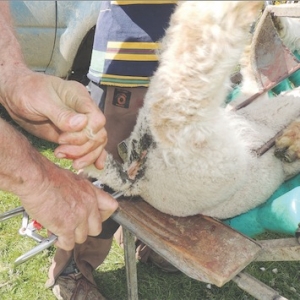TWO SEASONS into an investigation of the impact of tailing or docking lambs has prompted further analysis to see if longer tails could increase processing revenue by generating extra product for rendering or sale, says Alliance Group.
The cooperative last week released its final report on the research by AbacusBio Ltd on four farms – one in Southland, one in Canterbury, and two in Wairarapa. UK supermarket J Sainsbury’s, Beef + Lamb New Zealand and the Ministry for Primary Industries through the Sustainable Farming Fund were partners in the project.
The report concludes docking length or leaving tails intact has no long-term beneficial or detrimental effect on lamb growth rates, with the caveat that the work was done on farms with a low rate of flystrike.
An increase in dags was seen in lambs with tails docked long (5-7cm) or left intact which would increase the risk of flystrike in some environments. The report draws on previous studies to predict the likely incidence of flystrike from the dags recorded (see table).
B+LNZ research manager Geoff Ridley says there is a clear link between dags and flystrike.
“This research shows docking will be of most benefit in warmer, moist areas of New Zealand where blowflies are more prevalent over a longer season. It is something sheep farmers are already aware of, but these findings confirm and support our code of welfare, which permits docking when necessary to reduce the likelihood of flystrike.”
Alliance Group general manager livestock Murray Behrent says many myths surround tail docking and its impact on lamb growth which the trial has helped to dispel.
“It has provided objective scientific information about tail docking practices for our suppliers…. This is helpful research, but it does not represent the end of our work in this area. We are always looking at ways to improve the welfare of our livestock including exploring alternatives, practices and new technology to meet the needs of our customers.”
Behrent says Alliance continues to work with customers “to further consider the welfare implications” of docking and whether more research is needed.
In keeping with the dag findings, lambs with intact tails or long-docked tails (5-7cm) took longer to crutch than those with short-docked tails, reflected in a 31c/lamb increase in farmer/contractor costs between short and long-docked, and another 44c for intact tails compared to long. However, there was an 88c/lamb saving in not docking those with intact tails.

Trial detail
LAMBS WERE weighed at the time of docking, weaning and all post-wean drafts. Dags and flystrike incidence were also recorded at these times. The four tail lengths were: flush (1cm); short (3-4cm – common in NZ ); long (5-7cm – common in the UK); intact. Growth rate and yield work was done on one Southland Farm on 491 same sex twin-born lambs with a mix of breeds (maternal Coopworth/Texel; terminal Coopworth/Suffolk/Texel cross or Coopworth/Texel/South Down cross).
The production, welfare and economic impacts were measured on three farms: one in Canterbury with 840 Highlander-based crypt lambs and two in Wairarapa involving 840 Perendale-based mixed sex lambs and 840 Romney-based mixed sex lambs.
The full trial report is at www.alliance.co.nz.




















